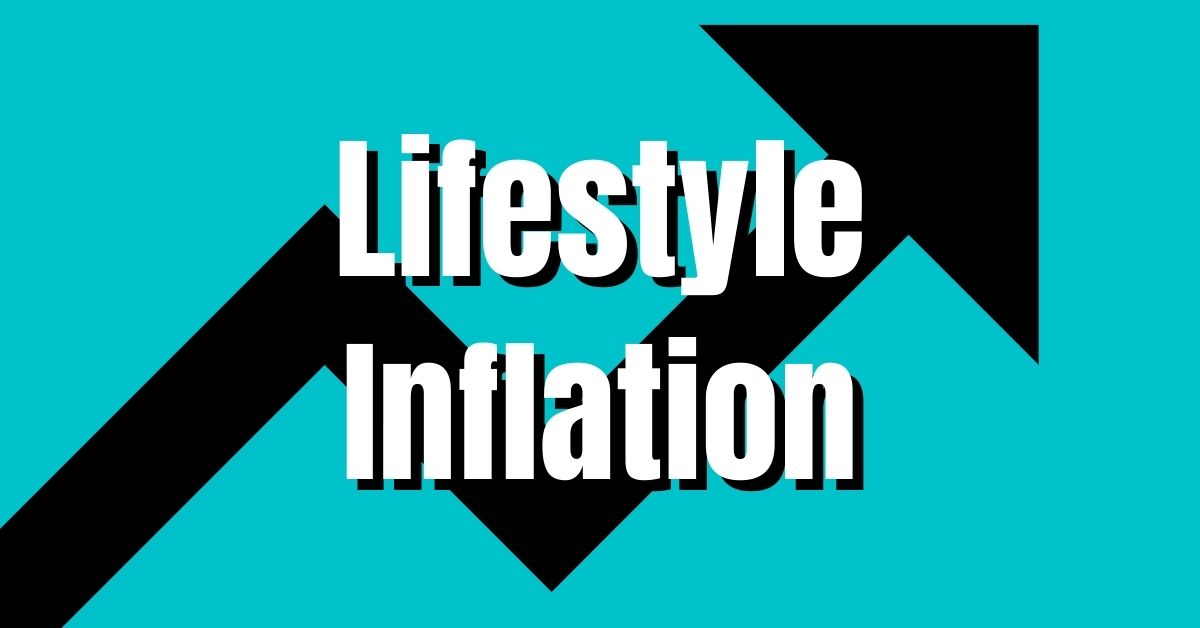Many people believe that lifestyle inflation is a bad thing. Often times, it is. However, there’s definitely a way to use lifestyle inflation to your advantage. The key lies in keeping your financial practices sustainable.
What is Lifestyle inflation?
Lifestyle inflation is the tendency to increase your spending as your income increases. An example of this might be buying a more expensive car or spending more money on dining out consistently after getting a raise at your job.
That is, despite having a larger income, no more progress is made towards your financial goals.
Once lifestyle inflation happens, it can be hard to revert back to lower expenses. We tend to get accustomed to a new standard of living we have set one. In other words, it’s difficult to cut back on expenses after they rise.
Using lifestyle inflation to your advantage
However, I believe that we can take advantage of lifestyle inflation if we are intentional about it. It’s something I practice to keep my finances sustainable while also making life more enjoyable. Lifestyle inflation can serve as motivation to keep pushing forward, but is only effective in moderation.
“Controlled inflation”
For lifestyle inflation to work in our favor, increases in expenses cannot increase as much as increases in income.
Let’s say I get a raise at my job that will pay me an additional $200 per month. I probably should not increase my expenses by that same $200 per month by financing a car or going out to eat an extra few times each month.
Instead, I could more modestly budget an extra night out with my wife each month. This may add an additional $60 to my dining out budget, but leaves the remaining $140 that I can invest or use to pay down debt more aggressively.
So I would still be advancing towards my financial goals more quickly, but not without also having more fun with my increased income.
Budgeting is a must when it comes to controlling our lifestyle expenses. When we track our expenses, it will paint the picture of where our money goes.
It is easy to overspend on our lifestyle if we are not careful to monitor our expenses. Otherwise, lifestyle inflation could more easily spiral out of control.
If you are new to budgeting, here is a great article to get started!
How I use lifestyle inflation to my advantage
My wife and I just recently moved into a larger house.
At first glance, our housing expenses almost doubled when compared to our previous residence. That’s lifestyle inflation, right?! You’re killing your progress towards financial independence.
However, I am keeping the residence we just moved from as a rental property. With this, my income will increase with the added costs of the new residence simultaneously. This added income with the rental will help offset the increased costs of our new home.
Our net housing costs have still increased slightly, but we will eventually turn this house into a rental as well. We’ll get to enjoy a much larger house in the meantime.
In other words, we increased our personal expenses, but bought another productive asset for our future. Sure, it might not be producing yet, but we can repeat the c
Staying Financially Flexible
But isn’t this making things more risky? What if our income falls or our tenants in the other property don’t pay?
For one, we always have reserves for all of the properties we own. So we can weather a storm for a fair bit of time before things get dire.
Another reason I am excited about this new house is that it has the ability to bring in income immediately if I need it to. The house has extra bedrooms which would allow me to house hack, though we are choosing not to while we are spending a lot of time working from home.
But the option is there should we decide we want to.
This house is also well within our financial means. We’re still investing the vast majority of our income, even if our expenses have increased a bit over the last year.
And, like I mentioned, this house will serve as a rental in the not so distant future, so we can continue building our wealth in real estate.
I could have bought a larger and nicer house (which would have come with an even higher mortgage). Instead, we chose to slightly upgrade our housing, which also happens to be an asset that can turn into a solid rental property.
In short, I was able to improve my lifestyle, but have not dramatically held back my financial progress. And I can still remain flexible enough to cover an emergency. There’s room to give.
If anything, it serves as motivation to keep pressing forward so I can enjoy an even better situation all while still getting closer to financial freedom.
Maintaining motivation
Building investments that generate income provides us with freedom and options.
Only with enough investment income can someone truly be financially free. And financial freedom is a huge goal to achieve.
Many people believe that they have to live on a shoe string budget for years until they become financially free.
Sure, that might be the quickest way to get to financial independence.
But is it the most sustainable?
If you end up quitting halfway through your journey to financial independence, or you’re terribly unhappy while you’re doing it, is it really worth it?
Some lifestyle inflation can make the journey towards financial independence that much more enjoyable, even if it takes a little longer.
So long as the inflation doesn’t increase more rapidly than your income, you will still accelerate your progress towards your financial goals.
The worst kind of lifestyle inflation will only hold you back. The productive kind, the kind that doesn’t outpace your growth in income, is simultaneously enjoyable and motivating.

Conclusion – Good vs. bad lifesyle inflation
Lifestyle inflation is something that we all need to keep in check.
It is very easy to get a promotion or raise at work and immediately want to spend more on our day to day life.
Jobs are not always a guarantee of a steady stream of income. Employers sometimes have to make difficult decisions and we may find ourselves out of a job or have that income reduced.
At the same time, investments are not always guaranteed to succeed.
The key is to constantly work to increase your income at a faster rate than your expenses. You’ll find yourself in an increasingly strong position.
Balance is key with lifestyle inflation. You do not want to make yourself miserable by not enjoying life. But you also do not want to destroy your progress towards your financial goals.
This website, and any communication stemming from it, while hopefully informative, should not be taken as financial or legal advice. Assume all links are affiliate links. I am an Amazon affiliate.


